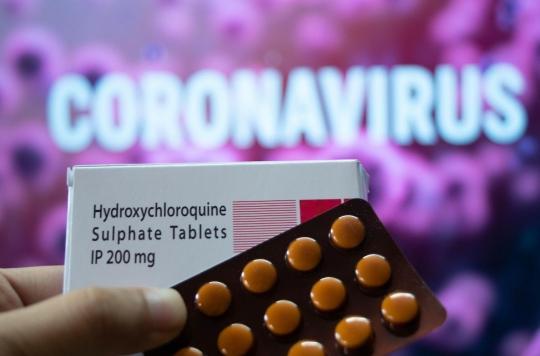Nine days after suspending all clinical trials on hydroxychloroquine, the WHO announced their resumption. At the same time, an American study, “too small to be irrefutable”, estimates that taking hydroxychloroquine shortly after being exposed to Covid-19 does not a priori prevent infection.

- The WHO estimates that there is no difference in mortality between patients infected with Covid-19 who use chloroquine and those who do not use it.
- American researchers have reported that there is no “significant benefit of hydroxychloroquine” for treating Covid-19.
- This study relates to insufficient data to be able to provide irrefutable proof of the ineffectiveness of chloroquine.
One shot is yes, one shot is no. Nine days after suspending all clinical trials with hydroxychloroquine, the World Health Organization (WHO) announced Wednesday June 3 to resume these activities. This announcement comes at the same time as the turnaround of the British scientific journal The Lancet who recognized “serious doubts” on his study dated May 22 last where she concluded on the ineffectiveness and the risk of death linked to chloroquine-based treatments.
No difference in mortality
After further analysis of mortality data associated with chloroquine treatments, the WHO decided to resume clinical trials. “We are now fairly confident that we have not seen any differences in mortality”, launched Soumya Swaminathan, chief scientist of the WHO, during a virtual press conference from the headquarters of the organization in Geneva, Wednesday, June 3. “There is no reason to change the protocol”, added WHO Director-General Tedros Adhanom Ghebreyesus.
After suspending the trials, the Organization announced that it was waiting for more information to decide on the future of these trials, called Solidarity, in the search for an effective treatment against Covid-19. Expected for mid-June, the WHO finally delivered its conclusions earlier than expected. The Solidarity trial executive group, which represents the participating countries, “received this recommendation and approved the continuation of all dimensions of trials, including on hydroxychloroquine”, he announced.
New study, with limitations, finds hydroxychloroquine ineffective
At the same time and to continue to confuse the issue of the effectiveness of chloroquine-based treatments, an American study estimates that taking hydroxychloroquine shortly after being exposed to Covid-19 does not a priori allow prevent infection. However, this study has many limitations since it istoo small to be irrefutable”, warns Martin Landray, a professor of medicine and epidemiology at the University of Oxford who was not involved in the study. This study was conducted among 821 people in the United States and Canada who all had contact with a coronavirus-positive person for more than 10 minutes from a distance of two meters or less. The majority of them were considered “at risk” of being contaminated because they were not wearing a mask or eye protection at the time of the interaction with the infected person. They were then randomly given either hydroxychloroquine or a placebo within four days of this contact.
The researchers reported that there is no “significant benefit of hydroxychloroquine”. For this, they analyzed by laboratory tests and the study of symptoms how many of them contracted Covid-19 in the following two weeks. The difference between the number of patients who developed the disease in those who received hydroxychloroquine (49 of 414 patients, or 12%) and those who received a placebo (58 of 407 patients, or 14%) does not was not considered statistically significant. Also, side effects were more common with hydroxychloroquine than with placebo, but in both cases they were not undesirable.
.















